Raf and O - Interview
by John Clarkson
published: 6 / 8 / 2019
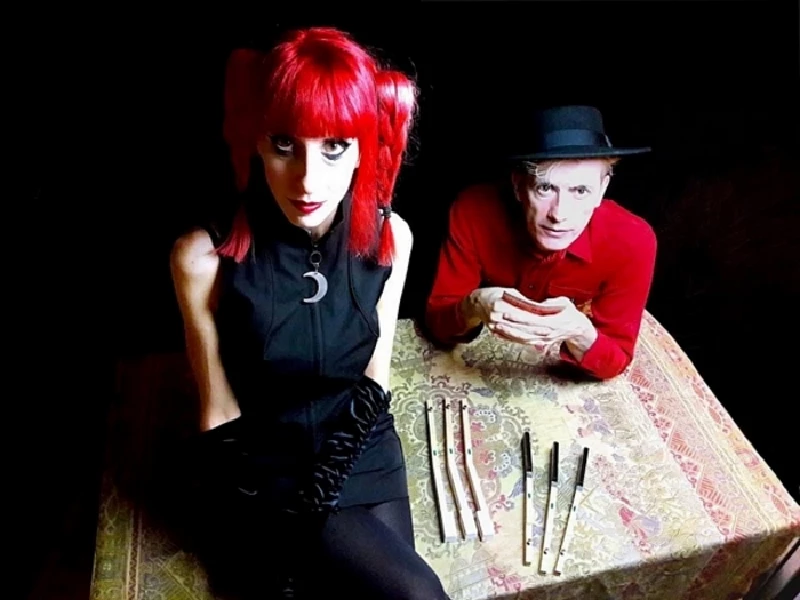
intro
South London avant-pop duo Raf and O speak to John Clarkson about their just released fourth album, ‘The Space Between Nothing and Desire’.
South London avant-pop duo Raf and O have recently released their fourth album, ‘The Space Between Nothing and Desire’. It follows on from ‘A Giant in the Snow’, ‘Time Machine’ and ‘Portal’, all of which have also like ‘The Space Between Nothing and Desire’ been released on the band’s own Telephone Records. ‘The Space Between Nothing and Desire’ is an album of hypnotic but unconventional beauty. Raf Mantelli's delicately swooning vocals have an astonishing, underlying power. Instrumentally her hazy guitars and her fragile-sounding piano work, alongside O Richard Smith’s unorthodox percussive set-up, in which he mixes electro-acoustic drums with triggers and synths, prove to be a similarly beguiling tour-de-force. It opens with ‘A Bow to Bowie’, a tribute and thank you note to David Bowie who has been a huge influence on Raf and O. Elsewhere there are ethereal-in-tone covers of Bowie’s 1966 early single ‘The London Boys’ and Scott Walker’s ‘Such a Small Love’, which was recorded before the latter’s death earlier this year. The title track reflects on how it is better to feel something rather than to allow ourselves not to feel anything at all, and ‘With Fatzer’ was inspired by a night at the theatre to see a modern reworking of Bertolt Brecht’s unfinished verse play ‘Downfall of the Egotist Johann Fatzer’. Long term fans of Raf and O, who opened our 20th Anniversary Bands’ Night last year, Pennyblackmusic spoke to Raf Mantelli and Richard Smith about ‘The Space Between Nothing and Desire’. PB: You have both lived and worked in London for a long time. Yet you are both originally from elsewhere, Raf from Florence and O from the North of England. Do you think that has had an influence on your music? RAF MANTELLI: It’s a very interesting question that leads me to think of where are we really from? From my part, mind travels have a far stronger pull when it comes to a direct influence on the music of Raf and O, but there’s no doubt that a part of us is shaped by our surroundings and where we’ve grown up, though maybe our choices are what ultimately helps to define who we are or what path we might walk through. Florence is steeped in a rich past, so your mind can’t help but constantly reconstruct a time that was. A film goes on in your mind as you walk around and take in its surroundings. Artistic expression run in the family with my dad who was a self-taught painter in his spare time and my auntie a published poet and designer, I have a background in graphic art, though I spent most of my life focusing on music and sharing this and my love and life journey with O Richard in London. O RICHARD SMITH : Yes, London is our home and I was nearly a Southerner too…I grew up on the East Yorkshire coast, though it was possibly to have been Chichester. Mum was a Brixton girl she and my dad eventually settled in surroundings more familiar to him! Here nautical experiences became much of my learning alongside structural and mechanical understanding. Thinking about the relevance of this and influence on musical creativity, I guess it probably really has. At sea, situations change, land disappears, nothing is truly constant wind and weather wise whilst constant reactions and adjustments to the rig are the norm. Fate, perhaps being the only constant. Writing/ performing and dealing with technicalities may use the same engine of mind, though much safer and drier. Having been at sea together with Raf, less Raf's and certainly more familiar a domain to me, has been at the base of a few tracks for sure. The light at sea especially at the break of dawn has clearly driven some of her writings, as have dark threatening evening skies too. Nature is a great provider. PB: Many of the tracks on the album - the title track certainly, but also ‘Underwater Blue’, ‘Anger’, ‘Your Gazing Stare’ and ‘Haunted’ - seem to be about the importance of feeling some kind of emotion, however difficult, rather than not anything at all. Do you see that as the underlying theme of ‘The Space Between Nothing and Desire’ and it as a concept album of sorts? ORS: Helm over to you, Raf! RM: As a child I was always drawn to let’s say a darker music than my peers. It’s hard to explain. It would heighten the senses, I felt really emotionally and physically connected to it, but the same music would seem to drive them away. That hasn’t changed to these days so, yes, you’re right, not feeling is the scariest thing of it all and I allow my fears, hopes, dreams, desires, whatever to inhabit the songs. And whenever we are making an album, we look for a musical and song journey, a connecting sequence, we spend a lot of time debating and arguing until we are both satisfied with the result. The title ‘The Space Between Nothing And Desire’ came to me one night, I don’t know where from and the lyrics for the title track followed quite quickly. Attraction and desire are certainly strong elements of this album. It’s looking for connections, for beauty within darkness. It’s a journey of discovery if you like. You always get to know yourself a bit better at the end of each album or at least one hopes to; I hope our listeners can make their own journey within it. We’ve received some really glowing reviews and I’m very grateful for that. PB: David Bowie has been a central influence on your work, and the opening track ‘A Bow to Bowie’ is both a tribute and a thank you to him. ‘Time Machine’ featured a cover of ‘Lady Grinning Soul’ from ‘Aladdin Sane’ and ‘Portal’ one of ‘Win’ from ‘Young Americans ‘. ‘The Space Between Nothing and Desire’ includes a cover of ‘The London Boys’, the B side to his 1966 ‘Rubber Band’ single. It is not an obvious choice for a cover. Do you feel that a Raf and O album would be incomplete without a Bowie cover now and why did you choose ‘The London Boys’ for this one? RM; He certainly has been a central influence on our work. The way he owned the space of the characters he imagined or someone else imagined for him were always incredible and ultimately seemed a vehicle for a journey into inner space. An example of how he could bring to life someone else’s vision, in this case Nicolas Roeg, would be Tommy Newton in 'The Man Who Fell To Earth'… that left quite a mark on me. When he died, it was a shock, I really wanted to do something more in his honour and I wanted to say thank you and that’s how ‘A Bow To Bowie’ came to be. I was sure it had to be the opening track, a kind of a key, that opens the door to the album. We decided to cover ‘The London Boys’, I loved this song since my teens and often thought about it. He was a teenager when he wrote it. I seem to gravitate towards not the obvious tracks, I always have. It’s mournful and I love the whole ambient within it. We re-approached the track, as we usually do, but keeping within its spirit. You have to somehow make a track your own so it can project. As much as I truly love Bowie I can’t predict what our future albums will be like and that is one of the things I love about him, that element of surprise. You could never know what he was about to do. ORS: ‘The London Boys’ is a great song that vividly conjures up a youth’s personal journey in the capital. In it I imagine the streets my mother would have known well. Raf in her own way captures some of that magic for me and though it's not the most known Bowie track we both agreed it was right for this album. PB: The other cover on ‘The Space Between Nothing and Desire’ is of Scott Walker’s ‘Such a Small Love’, which originally appeared on his debut solo album, ‘Scott’. What was the appeal to you of recording that? RM: Love Scott Walker’s work and I wanted to cover a track from his first few solo albums. I found the track very compelling. The way its story is visualised and painted/ brought to life in the music is very stirring and I found myself listening to it over and over again. I partly obsess if you like on things I love so the passion started and my interest developed beyond being a listener. We found an angle and recorded it in 2016, just after releasing our last album ‘Portal’ and these last three years we’ve worked the material that has eventually concretised itself to be ’The Space Between Nothing And Desire’ album. ORS: Raf definitely buzzes when immersing in that melodious harmonic eerie dark pop. We were in Italy, the sun was really going for it and hearing her squared off rhythmical approach worked so well that we arranged and recorded it all in a single space, making good use of a huge wardrobe, opening it up as required to control the room which was hard walled and spartan. As an ad-hoc vocal booth it proved quite effective. So glad we recorded it then, in the moment, rather than wait to be at base - it worked out well. Raf mixed it down on headphones and later checked on speakers after putting it up when back at the studio. All sat just right. The downside - consistency of the studio tan! PB: ‘With Fatzer’ was written after seeing a theatre production and reworking of Bertolt Brecht’s unfinished verse play ‘ Downfall of the Egotist Johann Fatzer’. In what way did that prove inspiring? ORS: We saw the play together, whic h is a powerful, challenging work. The song flowed out at some point after - it's been interesting as I have fond memories of a few of the ways in which the track has flowered over time, sort of echoing the clashing dynamic of the performance we witnessed. This take on the song is my favourite version. RM: The play involved physical theatre. There were tales within the tale, the Great War, the internal conflicts of the protagonists against the background of the wider conflict and a woman. I love the textural backdrop that O laid out against the piano and voice. I tried mainly to re-imagine this story from the point of view of the woman. PB: You have said in the past that you see each of your albums as “having its own personality.” What do you see as the main components of this album’s personality? RM: I’m probably reiterating myself in as much as desire and attractions are strong elements of this album and it’s looking for connections and in fact the more I’m thinking perhaps connections is the biggest one. PB: You are a strong live act, but your music is unorthodox and complicated, involving changes in time signatures and tunes within tunes and lots of different instrumentation. O’s stage set-up is also unusual. How difficult is it transferring what you have achieved on the studio to stage? RM: It throws a good dose of challenges our way, as we wanted to keep it live, whilst being a two-piece band. The set up has also grown. Our vocal, guitar, two synths and electro-acoustic kit rig has come to incorporate a piano and bass/ double bass. Recently I have allowed myself to reconnect with the piano in a really big way. As a musician, outside of being a songwriter/vocalist/producer, piano is my first instrument before guitar, but as a self-taught guitarist, I often wrote songs with it and found it an inspiring musical device. In previous albums I would make great use of the guitar and synths as well. It is the same with Richard. He is first a bass player, but a drummer and synth player too - we found this format created a sound and a musical focus that allowed inspiration to flow. In ‘The Space Between Nothing And Desire’ we were ready to expand, though the minimal approach remains a big aspect of what we do. ORS: There is an aspect of sound-worlds within song detail, which suits, or seems to suit picking up or hitting something different. In the studio anything can go and we have our own inner thoughts as to whether the live result should be in mind during the making. Being a pint-sized band of two means premature over-thinking the performance can be a bit tricky, we can fight pretty well over things so we do try to leave most of that process till afterwards. That might mean a different approach as a result, and that is on a song by song scenario. Sometimes it takes a fair bit of time and reflection to get the balance right. My role varies a bit, my rig is not straight forward and has grown a little further. It gives me a good range of sound sources and ways to play them, though upon waking from my octopus dreams, limb realities and abilities allied to the "rest of the band" being kept pretty busy too, tend to reground the live output somewhat. Yes, it can be difficult, I guess the short answer would be fifty fifty, as in, relatively easy through to …erm?… Head meets wall. We certainly don't choose the easy way and I feel the tension that brings along feeds into the performance. PB: You have also over the last year and a half been playing gigs covering Kate Bush songs under the moniker of The Kick Inside. Do you think as a result Kate Bush has had more of a bearing on this album than any other of your records? This other project is named after Kate Bush’s first album and focuses on the early part of her career. Why have you focused on that rather than the other stages of her recording output? RM: When I first started writing songs, a friend at the time gifted me a copy of ‘The Kick Inside’, Kate Bush’s first album, said that I should listen to it. I guess he could hear some parallels. I fell in love of course with the album and Kate’s beautiful work has certainly been one of my influences. When recently we decided to create a performing project centred around her songs, The Kick Inside felt like the right name. I like the exuberance and intricate movements of her early writing, a magical ingredient, which then evolved into her more personal involvement into the whole production. The other thing is that being an acoustic side project delivered solely on vocal piano and double bass, that material really lent itself towards been performed that way. Having said that, we have covered songs up to and including tracks from 'The Hounds Of Love', which have seen us, re-approaching them for obvious reasons. We had some fantastic responses to these performances across the country which has been great. ORS:It's been really nice to explore Kate’s early tracks and they’re great to play double bass on against the piano and vocal. For Raf that period of Kate resonates as range wise and dynamically they’re in a similar ball park and though they have different colours and contours, it is a really natural vocal fit. Because some of the songs on this album are melodically high and rangy I can see how they may acquire comparisons. Not long ago I spoke briefly with Brian Eno on the subject of influences as some of the music from our ‘Time Machine’ album had been compared to ‘Before And After Science’. He said people tell him that they can hear what his are but he said that he doesn't hear them himself. I guess in a way this shows how the listener can reverse engineer their own starting pallet from experiencing a finished painting. PB: ‘The Space Between Nothing and Desire’ is worth buying on CD for the packaging alone, which is typically stunning. A crescent moon necklace which Raf is wearing appears on several of the accompanying photos. What is the symbolism and significance of that? RM: We take care with the album artwork, and are very glad you like it. It’s very important for us to visually create a space that encapsulates the sound component of the album. And well, attraction is a big component of this album. The moon seems to bring that into focus, complicated and fascinating, ocean tides, air meets water, la luna, its pallor, solitary yet in sync with the rhythm of time, but at night when the hustle and bustle of life seem to quiet for a while and you can forget all distractions, you have the illusion that time (which I still don’t understand) may stay still for a while. That’s when I find inspirations flows mostly. ORS: For me it's about the planets driving both time and tide, the moon does its own thing time wise and though relatively small it yields a massive effect. PB: Your last two launch shows for your albums took place in London churches, Shoreditch Church for ‘Time Machine’ and St James the Less for ‘Portal’, which particularly well suited your ambience and vision. Why did you decide to launch ‘The Space Between Nothing and Desire’ in a more conventional setting and regular venue in the Servant’s Jazz Quarters in Dalston? RM: We liaised with our dear friend Klarita from Kaparte Promotions with whom we launched our albums since ‘Time Machine’ as to a minimal setting that fitted the concept of ‘The Space Between Nothing And Desire’ and Servant Jazz Quarters as an intimate venue was ideal providing the inner space we were looking for. If you think about it, ’Time Machine’ deals with the aspects of time-space vastness and ’Portal’ both, a door into the past and its name, the entrance to a church and it really suited previous venue choices. PB: Thank you.
Band Links:-
http://rafando.comhttps://www.facebook.com/rafando/
https://twitter.com/_rafando
https://www.youtube.com/user/rafandovideo
http://www.songkick.com/artists/778654-raf-and-o
http://www.last.fm/music/raf+and+o
Picture Gallery:-
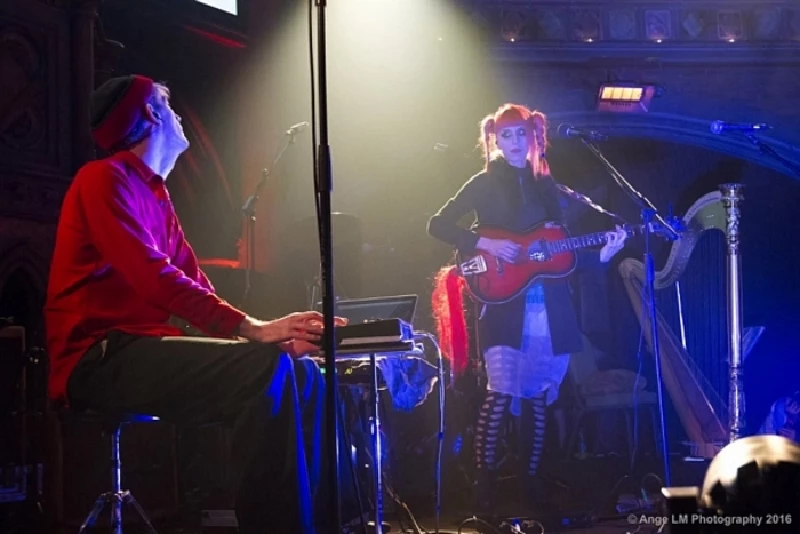
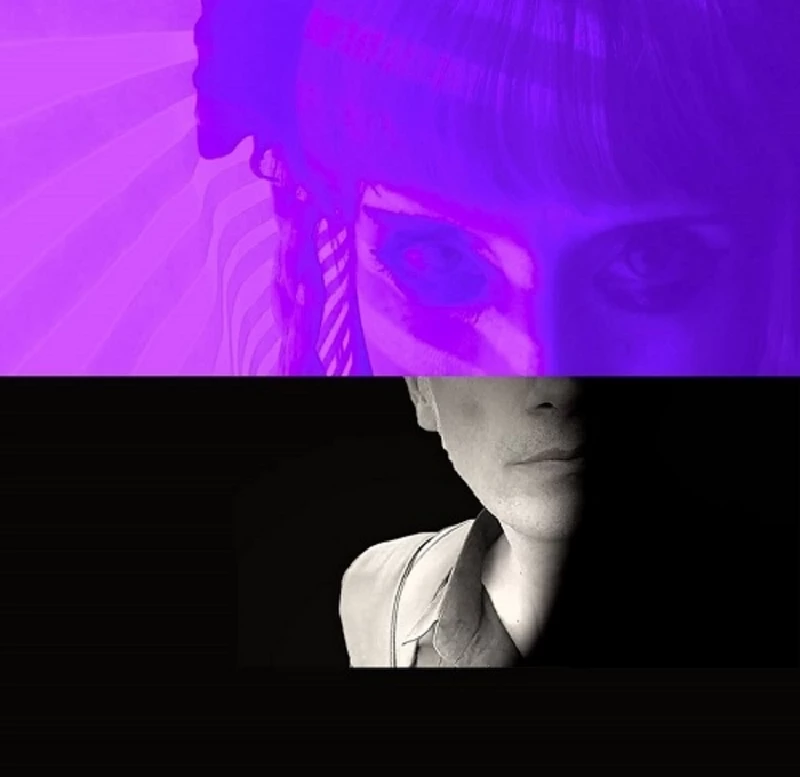
interviews |
|
Interview (2016) |
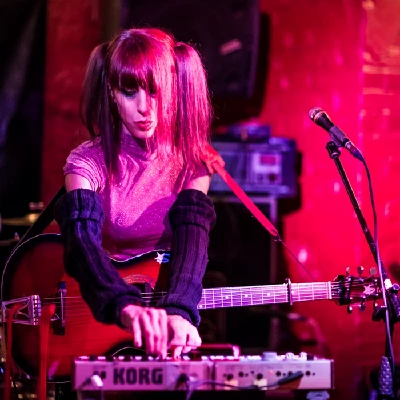
|
| Dominic Simpson speaks to Raf Mantelli from South London-based elecro-acoustic duo Raf and O, who will be performing at the next Pennyblackmusic Bands' Night, about their history and soon-to-be-released new album |
soundcloud
reviews |
|
The Space Between Nothing and Desire (2019) |
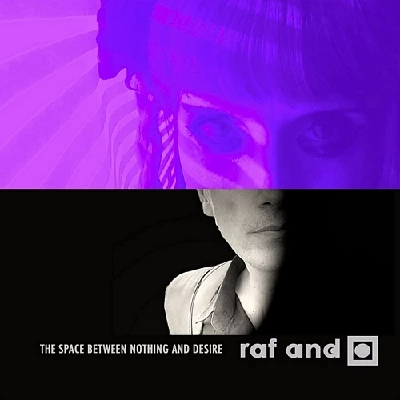
|
| Haunting and compelling fourth album from unconventional South London-based electro-acoustic duo Raf and O |
| Portal (2016) |
most viewed articles
current edition
Peter Doherty - Blackheath Halls, Blackheath and Palace Halls, Watford, 18/3/2025 and 21/3/2025Armory Show - Interview with Richard Jobson
Liz Mitchell - Interview
Lauren Mayberry - Photoscapes
Deb Googe and Cara Tivey - Interview
Max Bianco and the BlueHearts - Troubadour, London, 29/3/2025
Sukie Smith - Interview
Garfunkel and Garfunkel Jr. - Interview
Maarten Schiethart - Vinyl Stories
Clive Langer - Interview
previous editions
Heavenly - P.U.N.K. Girl EPBoomtown Rats - Ten Songs That Made Me Love....
Trudie Myerscough-Harris - Interview
Doris Brendel - Interview
Oasis - Oasis, Earl's Court, London, 1995
Beautiful South - Ten Songs That Made Me Love...
Dwina Gibb - Interview
Pulp - Ten Songs That Made Me Love...
Kay Russell - Interview with Kay Russell
Sound - Interview with Bi Marshall Part 1
most viewed reviews
current edition
Davey Woodward - Mumbo in the JumboNigel Stonier - Wolf Notes
Wings - Venus and Mars
Kate Daisy Grant and Nick Pynn - Songs For The Trees
Only Child - Holy Ghosts
Neil Campbell - The Turnaround
Philip Jeays - Victoria
Darkness - Dreams On Toast
Suzanne Vega - Flying With Angels
Charles Ellsworth - Cosmic Cannon Fodder
related articles |
|
Nick Garrie: Feature (2016 |
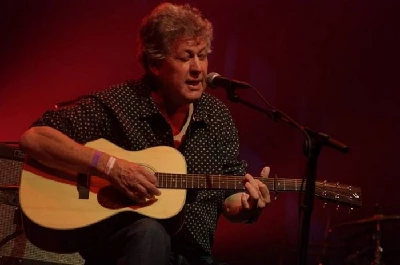
|
| We profile our next Pennyblackmusic Bands' night which will take place at the Montague Arrms in London, and will feature sets from Nick Garrie, Raf and O and Partisan Waves |
Pennyblackmusic Regular Contributors
Adrian Janes
Amanda J. Window
Andrew Twambley
Anthony Dhanendran
Benjamin Howarth
Cila Warncke
Daniel Cressey
Darren Aston
Dastardly
Dave Goodwin
Denzil Watson
Dominic B. Simpson
Eoghan Lyng
Fiona Hutchings
Harry Sherriff
Helen Tipping
Jamie Rowland
John Clarkson
Julie Cruickshank
Kimberly Bright
Lisa Torem
Maarten Schiethart